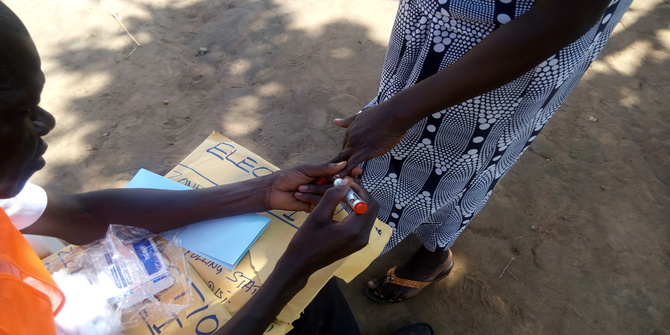LSE’s Noam Schimmel argues in a recent paper that the UN must change its mode of justice for genocide survivors.
Eighteen years have passed since one of the most intense and brutal genocides took place in Rwanda. Almost a million Tutsis were murdered by Hutu extremists in approximately 100 days. Many of those who survived continue to suffer from deprivation and poverty today.
Traditionally, the UN applies retributive justice to create accountability and end impunity but LSE’s Noam Schimmel argues that restorative justice should be applied as an extension of the principle of the Responsibility to Protect (R2P) in his recent paper, The Moral Case for Restorative Justice as a Corollary of the Responsibility to Protect: A Rwandan Case Study of the Insufficiency of Impact of Retributive Justice on the Rights and Well-being of Genocide Survivors.
The principle of R2P is meant to address the international community’s failure to prevent and stop genocides. Schimmel argues that this moral and legal principle “lacks coherence and integrity if it fails to acknowledge that the consequences of genocide extend long beyond the date at which a genocide technically ends and some form of stability and peace, however tentative, returns”.
Schimmel points out that, in some cases, genocide can continue for years because the consequences of AIDS perpetuate a slow process of killing. Many victims of sexual and other forms of violence are left with ongoing life-threatening physical wounds and illness, and psychological stress and trauma are common among genocide survivors. For this reason, R2P must take into account the protection that survivors of genocide need in the medium and long term.
Most definitions of restorative justice include a measure of reparation and reconciliation. However, Schimmel says that while reparation must play a central role in restorative justice, it is unethical that reconciliation, particularly when extraordinary human rights violations are involved, is required implicitly or explicitly from survivors of genocide.
Instead, the primary concern of restorative justice post-genocide should be to focus on protecting and realising the rights and needs of survivors and ensuring their well-being.
This is very much the view of those who suffered through that very difficult time in Rwandan history.
“You cannot have reconciliation,” one survivor said.
“You reconcile two people if it is just a problem, but not when it involves death – it is not appropriate. In effect you are telling victims to shut up.”
In Schimmel’s concept of restorative justice, he puts the victim at the centre. This means their needs become a paramount priority legally, morally, psychologically and socially. While this model acknowledges that “such efforts will likely increase social cohesion, general welfare, the possibility of reconciliation and a sustainable basis for peace through greater equity and human freedom, it does not use itself as an instrument for the sake of achieving these goals”.
In contrast, retributive justice does not ensure that genocide survivors are housed and clothed, that they have access to education, a decent living and adequate nutritional provisions and that they receive the healthcare and psycho-social support services needed to rebuild their lives and rehabilitate their communities. It concerns itself with a very narrow and exclusive remit: to punish perpetrators.
Schimmel cites Morocco as a comprehensive model of providing restorative justice. The government has distributed 85 million dollars in funds to address human rights violations that took place in Morocco mostly between 1981-1991. The money has been used to provide health care, education, a memorial site and employment-creation programmes.
Eighteen years after the genocide, it is still not too late to apply restorative justice in Rwanda. The well-being of 400,000 survivors depends on it.







Very interesting argument and one which is making sense when looking at the genocide from the survivors perspective. How can I access the full paper please?
There is a link to the full paper in the second paragraph of the article and also at the end of the article. Glad you found it interesting.
Mr Noam Schimmel is right. Genocide needs, as well as reparation and restitution, have not been a priority in gacaca courts for several reasons. It was never a priority for the interahmwe to make reparation for the peoples they killed, rather the focus was on them was confessing their actions so that the court would find out who committed the genocide crimes with the aim of correction and reintegration. The reason for this was that the priority for the post-genocide government was, and i guess still is, the UNITY AND RECONCILIATION of Rwandan communities.
However, I disagree with with Mr Schimmel that R.J. does not have the mandate to make social cohesion,reconciliation,sustainable basis for peace…or making it a goal, because in the case of Rwanda,”sustainable peace, social cohesion, general welfare even reconciliation was and are at the centre and goal of gacaca courts”. Unity and reconciliation of Rwanda through gacaca courts as restorative justice were the goals to reach, so i guess every case, country, culture and unique socio-political context, can adapt the restorative justice concept and practices to his own realities and understanding.
Still it is not only unethical to push genocide victims implicitly or explicitly to reconciliation, it’s worse to revictimise the victim and this has been done in Rwanda, genocide survivors live in a religious and political environment that forces them to reconcile with those who killed their loved ones. This needs a remedy.